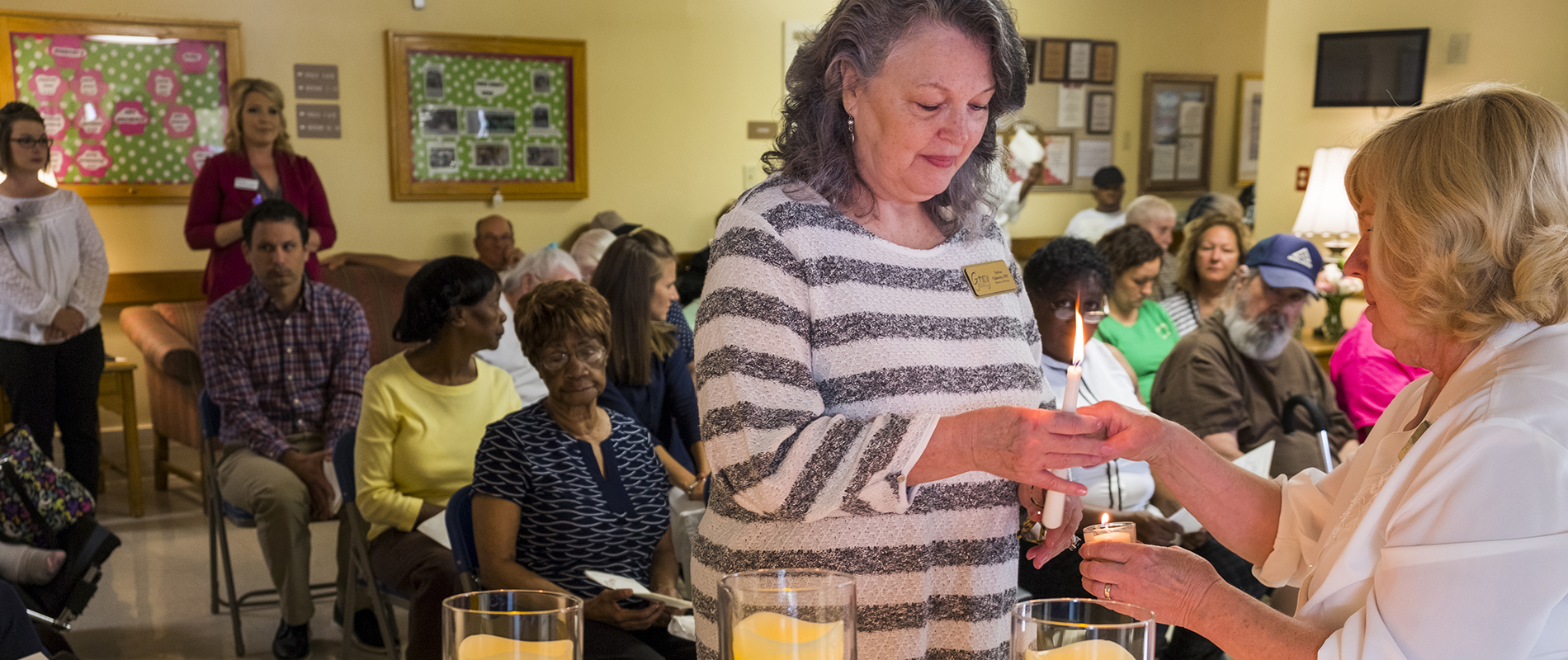Staff members at Gray Health & Rehabilitation participate in the annual bereavement ceremony. (Grant Blankenship for KHN)
GRAY, Ga. — One by one, their names were recited as family members clutched one another’s hands and silently wept.
Seventeen men and women had died within the past year at Gray Health & Rehabilitation, a 58-bed nursing home. Today, their lives were being honored and the losses experienced by those who cared for them recognized.
Death and its companion, grief, have a profound presence in long-term care facilities. Residents may wake up one morning to find someone they saw every day in the dining room gone. Nursing aides may arrive at work to find an empty bed, occupied the day before by someone they’d helped for months.
But the tides of emotion that ripple through these institutions are rarely openly acknowledged.
“Long-term care administrators view death as something that might upset residents,” said Dr. Toni Miles, a professor of epidemiology and biostatistics at the University of Georgia. “So, when someone passes away, doors are closed and the body is wheeled discretely out the back on a gurney. It’s like that person never existed.”
At Gray Health’s memorial service on this warm, sunny day, a candle was lit for each person who had died. Their images — young and vibrant, then old and shrunken — flashed by in a video presentation. “Our loved ones continue to live on in the memories in your hearts,” Rev. Steve Johnson, pastor of Bradley Baptist Church, said from a podium.
Dozens of family members gathered outside, each holding a white balloon. At the count of three came the release. Cries of “I love you” echoed as the group turned their faces to the sky.
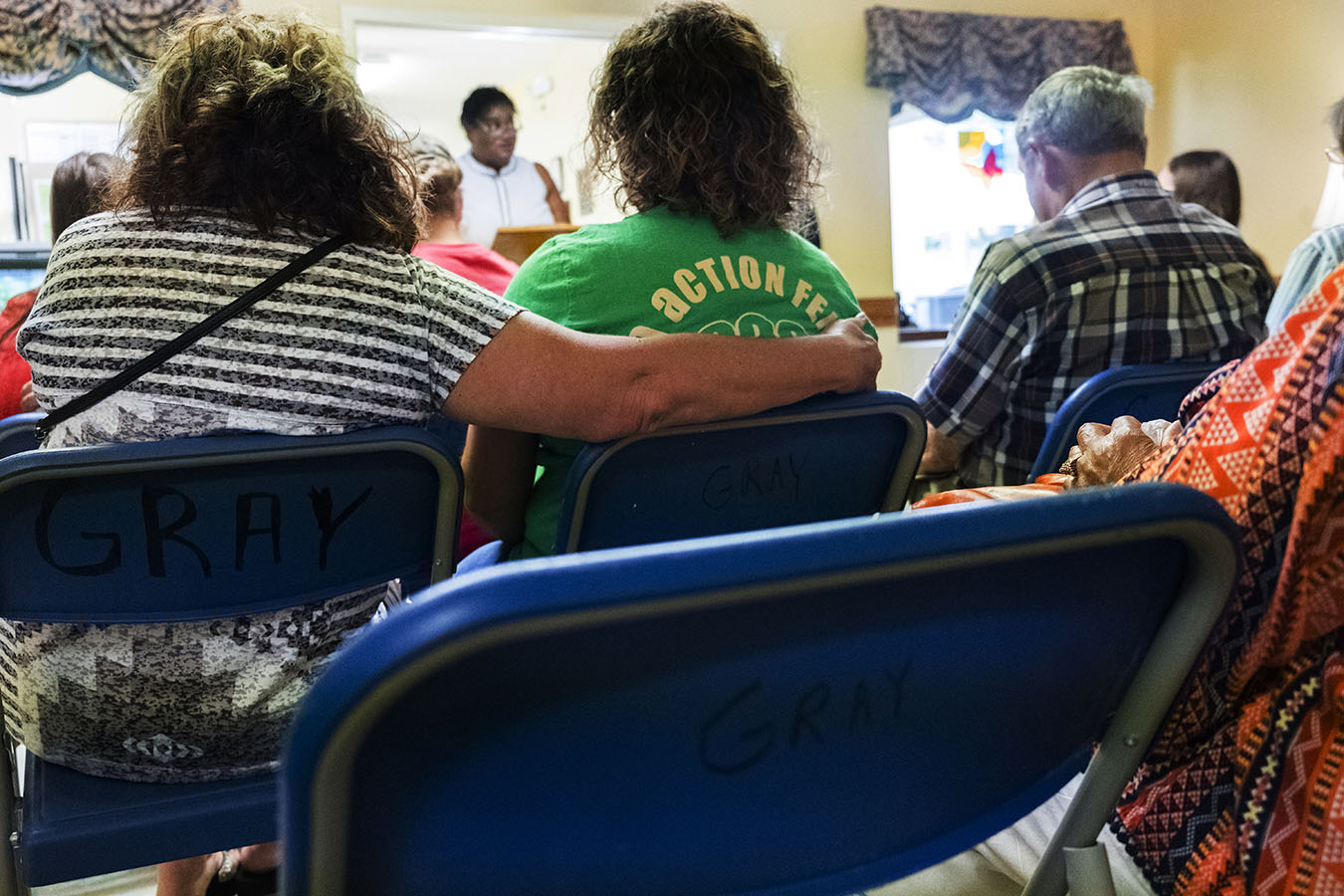
Sylvia McCoullough wraps her arm around daughter Kim Kohlmayer as they mourn Sylvia’s father, Melvin Henry “Bo” Daniels, at an annual bereavement ceremony at the Gray Health & Rehabilitation in Gray, Ga., on May 14, 2018. (Grant Blankenship for KHN)(Grant Blankenship for KHN)

Those mourning former nursing home residents pray together near the end of an annual bereavement ceremony at Gray Health & Rehabilitation in Gray, Ga., on May 14, 2018.(Grant Blankenship for KHN)
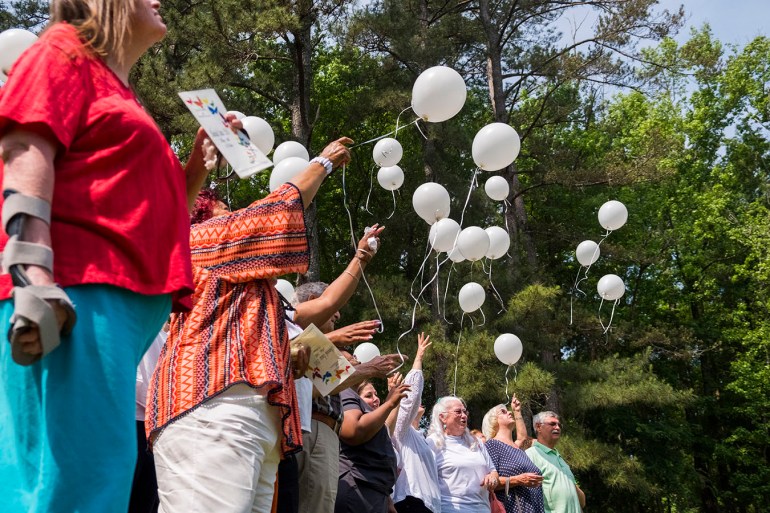
A balloon release concludes the annual bereavement ceremony at Gray Health & Rehabilitation in Gray, Ga.(Grant Blankenship for KHN)
Miles wants to see bereavement openly acknowledged at facilities throughout Georgia to end what she calls “the silence surrounding loss and death in long-term care.” Following in-depth discussions with more than 70 staffers, residents and family members at nine facilities in central Georgia, she has created two handbooks on “best practices in bereavement care” and is gearing up to offer educational seminars and staff training in dozens of nursing homes and assisted living residences across the state.
“Dr. Miles’ work is incredibly important” and has the potential to ease end-of-life suffering, said Amanda Lou Newton, social services team leader at Hospice of Northeast Georgia Medical Center.
Fraught reactions to loss and death are common among nursing assistants and other staff in long-term-care facilities, research shows. When feelings aren’t acknowledged, grief can go underground and lead to a host of physical and psychological symptoms, including depression, distancing and burnout.
Joanne Braswell, director of social services at Gray Health, remembers a resident with intellectual disabilities who would stay in Braswell’s office much of the day, quietly looking at magazines. Over time, the two women became close and Braswell would buy the resident little gifts and snacks.
“One day, I came in to work and they told me she had died. And I wanted to cry, but I couldn’t,” Braswell recalled, reflecting on her shock, made more painful by memories of her daughter’s untimely death several years earlier. “I promised myself never again to [become] attached to anyone like that.” Since then, when residents are actively dying, “I find myself pulling away,” she said.
Sylvia McCoullough, 56, came to Gray Health’s memorial ceremony for her father, Melvin Daniels, who died on April 19 at age 84.
Two years earlier, not long before her mother passed away, McCoullough had realized that her father had dementia. “He was the strong one in our family. … He always took care of us,” she said, explaining that her father’s confusion and hallucinations shook her to her foundation.
“I cry all the time,” McCoullough continued, looking distressed. “It’s like I’m lost without my mom and dad.” But Gray’s ceremony, she said, brought some comfort.
Edna Williams, 75, was among dozens of residents at the event, sitting quietly in her wheelchair.
“I love to recall all the people that have passed away through the year,” said Williams, who sends sympathy cards to family members every time she learns of a fellow resident’s death. On these occasions, Williams said, she’s deeply affected. “I go to my room” and “shed my own private tears” and feel “sadness for what the family has yet to go through,” she said.
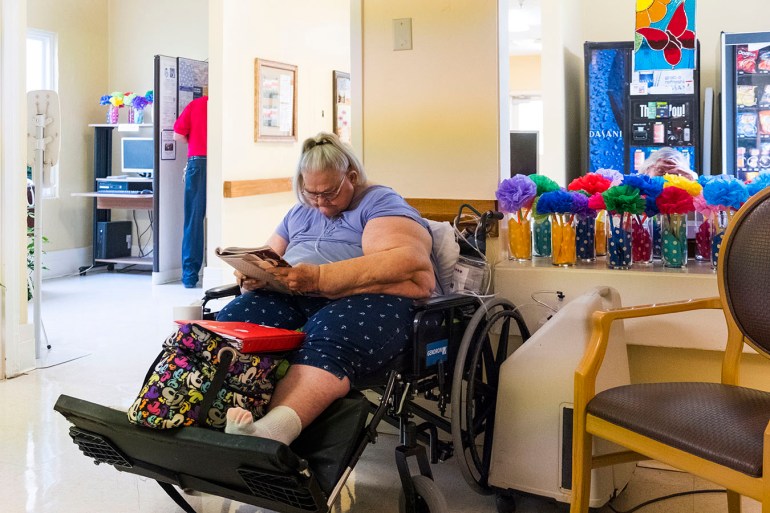
Edna Williams is a resident of the Gray Health & Rehabilitation in Gray, Ga., and a former certified nursing assistant in an assisted living home in her hometown of Statesboro, Ga. When a resident at Gray Health dies, Williams sends their family sympathy cards, which she asks staff and residents to sign — “to let their families know that we really care and understand their feelings," she says.(Grant Blankenship for KHN)
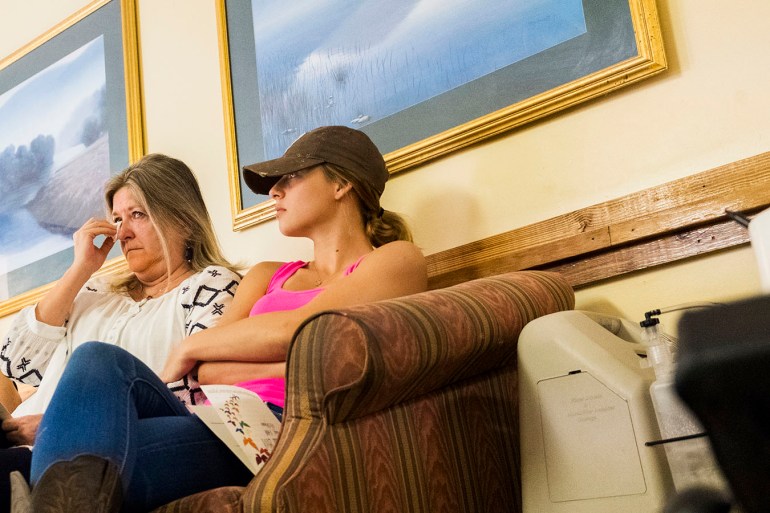
Cathy Bass (left) and granddaughter Heaven Melton attended the bereavement ceremony at Gray Health & Rehabilitation in remembrance of Bass' brother, Timothy Marion Sanders. "I miss him every day," she says.(Grant Blankenship for KHN)
Chap Nelson, Gray Health’s administrator, has instituted several policies that Miles’ bereavement guide recommends as best practices. All staff members are taught what to do when a resident dies. When possible, they’re encouraged to attend the off-site funerals. Every death is acknowledged inside the building, rather than hidden away.
If one of his staff members seems distressed, “I go out and find them and talk to them and ask how I can help them with the feelings they may be having,” Nelson said.
Other best practices include offering support to grieving residents and relatives of the deceased, recognizing residents’ bereavement needs in care plans, and having a protocol to prepare bodies for final viewing.
Some facilities go further and create unique rituals. In one Georgia nursing home, staff members’ hands are rubbed with essential oils after a resident’s death, Miles said. In Ontario, Canada, St. Joseph’s Health Centre Guelph holds a “blessing ritual” in the rooms where people pass away.
Fifteen miles away from Gray, in Macon, Ga., Tom Rockenbach runs Carlyle Place, an upscale facility with four levels of care: independent living, assisted living, memory care and skilled nursing services. Altogether, about 325 seniors live there. Last year, 40 died.
“We don’t talk about it enough when someone passes here; we don’t have a formal way of expressing grief as a community,” Rockenbach said, discussing what he learned after Miles organized listening sessions for staff and residents. “There are things I think we could do better.”
When a death occurs at this continuing care retirement community, an electric candle is lit in the parlor, where people go to pick up their mail. If there’s an obituary, it’s placed in a meditation room, often with a sign-in book in which people can write comments.
Since working with Miles, Rockenbach has a keener appreciation for the impact of death and loss. He’s now considering starting a support group for staff and hosting a death cafe for residents where “people could come and hear what other people have gone through and how they got through it.”
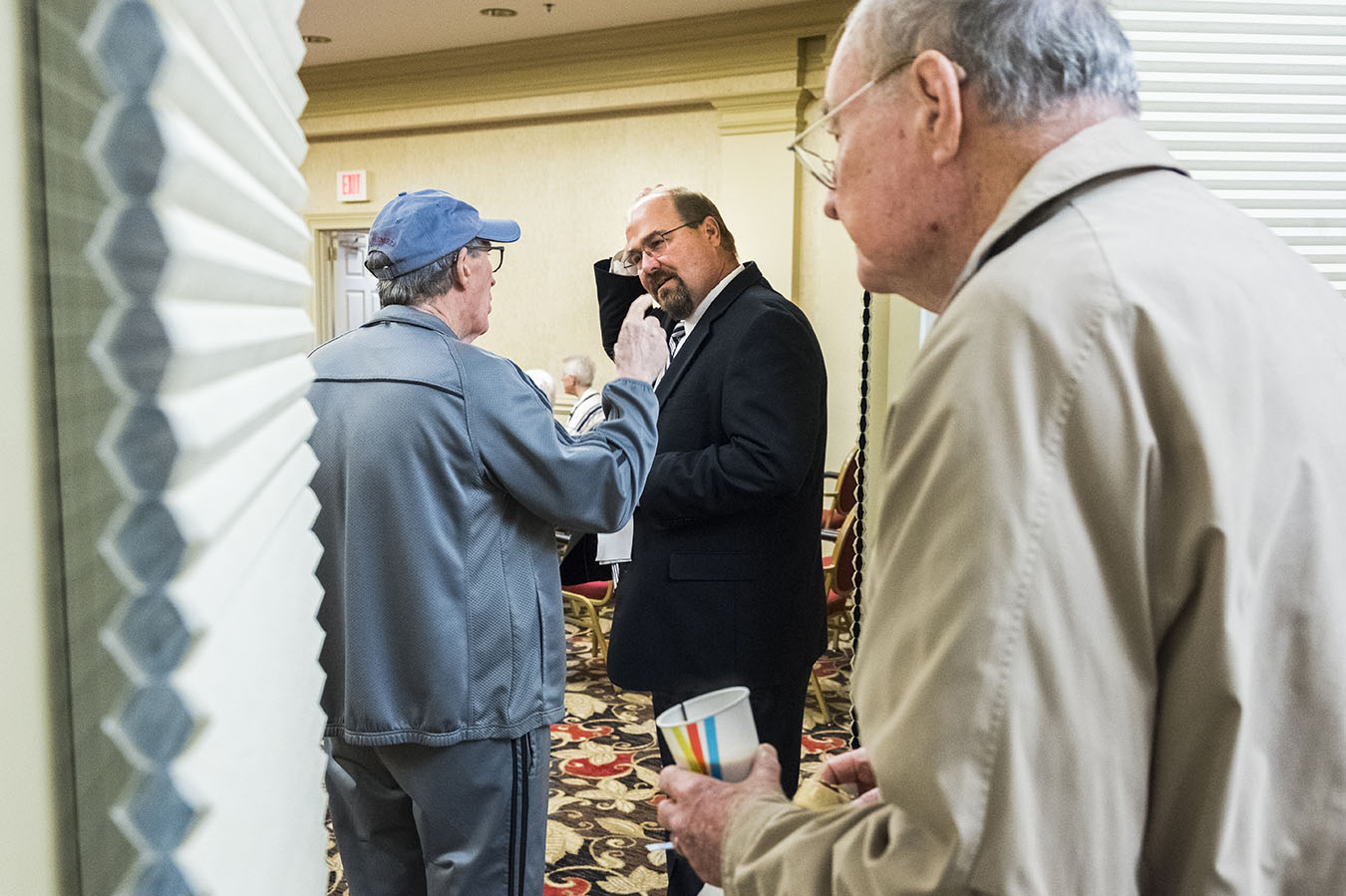
Tom Rockenbach (center) is executive director of the Carlyle Place senior living facility in Macon, Ga. Rockenbach is considering starting a support group for staff and hosting a death cafe for residents where “people could come and hear what other people have gone through and how they got through it.”(Grant Blankenship for KHN)
Tameka Jackson, a licensed practical nurse who has worked at Carlyle Place for eight years, became distraught after the death of one resident, in his 90s, with whom she had grown close.
“Me and him, we were two peas in a pod,” she said, recalling the man’s warmth and sense of humor.
Over time, the old man confided in the nurse that he was tired of living but holding on because he didn’t want family members to suffer. “He would tell me all kinds of things he didn’t want his family to worry about,” Jackson said. “In a way, I became his friend, his nurse and his confidante, all in one.”
One morning, she found his room was bare: He’d died the night before, but no one had thought to call her. Jackson’s eyes filled with tears as she recalled her hurt. “I’m a praying person, and I had to ask God to see me through it,” she said. “I found comfort in knowing he knew I genuinely loved him.”
Jan Peak, 81, was dealing with grief of a different sort in mid-May: Her husband, David Reed, who had rapidly advancing Parkinson’s disease, had recently moved to Carlyle Place’s assisted living section from their independent-living apartment— signaling the end of their time living together.
Like other people at Carlyle Place, Peak had a lot of adjusting to do when she moved into the facility five years ago after her first husband had died. “Lots of people here have come here from somewhere else and given up their homes, their friends and their communities, often after the death of a spouse,” Peak said. “Once you’re here, loss — either your own or someone else’s — is around you continually.”
She found herself turning to David, whose first wife had died of a brain tumor and whom she describes as a “soft, sweet, wise man.” Before they married, they talked openly about what lay ahead, and Peak promised she would carry on.
“No one can stop the heartache that accompanies loss,” but “my friends and family still need me,” she said.
In late May, David sustained a severe head injury after falling and died. “I miss him greatly as we were very happy together,” Peak wrote in an email. “I am doing as well as I can.”
KFF Health News' coverage of these topics is supported by John A. Hartford Foundation, Gordon and Betty Moore Foundation and The SCAN Foundation



